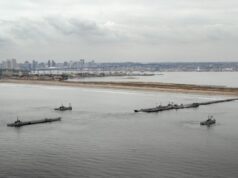U.S. President Barack Obama welcomed Afghan President Hamid Karzai last week to the White House to discuss the winding down of the NATO-led mission in Afghanistan. The two presidents reiterated their plan to end U.S. combat operations by 2014 but accelerated a plan to see the Afghan army take the lead in military missions. “Most unilateral U.S. combat operations should end” this spring, “with U.S. forces pulling back their patrols from Afghan villages,” read a joint statement.
Currently 66,000 U.S. troops remain in Afghanistan; however, local security forces lead some 80 percent of combat missions. The White House declined to announce how many American military personnel it wants to see stay past 2014 to fight insurgents and train the Afghan army. U.S. commanders suggest a figure between 6,000 and 15,000, but the Obama administration does not oppose a total withdrawal according to Deputy National Security Adviser Ben Rhodes.

U.S. President Barack Obama meets with Afghanistan’s President Hamid Karzai in the Oval Office, January 11, 2013. (Photo: Jason Reed/Reuters) |
A bilateral security agreement is needed to outline U.S. troop levels and their role past the current withdrawal date. Karzai has yet to sign such an agreement for fear of undermining Kabul’s sovereignty. Thus far, he has also refused to grant immunity from prosecution to American soldiers — a requirement for the Obama administration in order for troops to remain. Similarly in 2011, Iraq’s failure to grant American personnel immunity precipitated a full U.S. withdrawal. After returning to Afghanistan, Karzai said that the question of immunity should be decided by tribal elders. He also noted that Afghanistan will reach a decision on the issue by the end of the year, with another round of talks scheduled in Kabul.
Aside from the military transition, Afghanistan faces a number of challenges in the near future. There are no clear signs of success ending the war by diplomatic means in peace talks with the Taliban, and uncertainty remains over who will take the lead as Afghanistan’s next president after the upcoming elections, scheduled for 2014.





